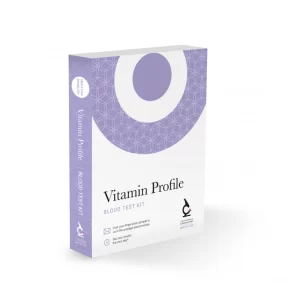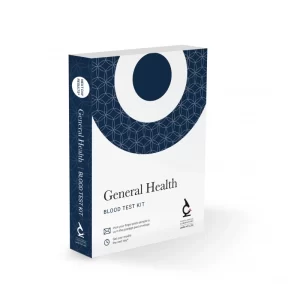Description
What can a blood test tell you about your general health?
One in 100 people do not produce antibodies against their vaccine and not developing antibodies against the virus has been linked to increased hospitalisation and serious illness. Recent research has shown that the early immune response in people who have been vaccinated for COVID-19 can predict the level of protection they will have to the virus over time and potentially your body’s efficacy to combat viral variants such as the delta variant currently responsible for majority of new Covid-19 cases in the UK. Some scientists have suggested that a test for antibody status may now become the norm when people are admitted to hospital with severe Covid-19.
This new test (January 2021) “was designed to aid in evaluating the immune status of individuals with a quantitative measurement of IgG antibodies against the spike receptor binding domain (RBD) of SARS-CoV-2.”
The home test uses a finger-prick blood sample you can take yourself in the comfort of your own home. Or you can choose to have a blood sample taken in-store.
Whether you have been recently vaccinated or caught Covid-19 naturally, this IgG test will confirm whether your immune system has developed neutralising IgG antibodies and give you a quantitative measure of your body’s response (between levels of 0 – 80,000 AU/ml).
It will help you to know how your immune system has responded to vaccination or an infection to confirm whether the illness you had was Covid-19 or something else.
IgG levels often reduce quite quickly in the months after an infection and this test will enable you to monitor your IgG levels over time to see if your levels are dropping to below the levels that may be assumed to give immunity.
You can complete your Coronavirus IgG Antibody Home Test in three ways:
- At-home – Have the finger-prick testing kit delivered to you where you can take your blood sample, register your test and return it to our lab via a supplied Royal Mail 1st Class envelope.
- In-store – Book an appointment to have your blood sample taken by our trained team at your nearest London Medical Laboratory site (additional £30 phlebotomy fee applies).
- Home Visit Phlebotomy – We organise a certified phlebotomist to take your blood from your home or office if you live within the M25 (addition £80 phlebotomy fee applies).
Once your sample has been processed, you will receive your results via email. Please don’t forget to register your test before sending it back to us (link will be provided after purchase).
To get tested, order your IgG Quantitative Immune Response Test today.
How is this test different from the older antibody tests and what will it tell me?
The older IgG and IgM antibody tests checked if you had antibodies in your system from being infected with Covid-19 in the past.
With this new quantitative test – produced by the world’s leading laboratory diagnostics provider – you will know if you have had Covid-19; and if your vaccination has worked. You will also get an accurate measure of by how much your immune system has responded. This is a great improvement and gives you much more useful information than was previously available to us.
Your sample will be analysed for the actual level of IgG antibodies in your body. If you receive a positive result, this is because the test detected an AU/ml level of above 50 units, which can be taken to confirm that you have been either been exposed to coronavirus or that your body has produced an immune response to your vaccination.
This latest IgG test also measures a different viral protein than the previous one (from May 2020). The old IgG test would not measure whether your body has responded to the different vaccines whereas this new test does. This quantitative IgG test measures your levels of IgG antibodies against the spike receptor-binding domain (RBD) of SARS-CoV-2 whereas the previous test measured IgG against nucleoprotein. The spike protein is the main protein that is associated with the body mounting an immune response. It is also the protein which all the immunisations are mimicking to get the body’s immune system to fight off the virus so this test will tell you how well your body has responded to the vaccine.
Please note, it is not yet clear how your immune response relates to whether you are immune or not. Please see this whitepaper for more details. Research into this is ongoing so do not presume you are immune – even with a positive result. This virus has not been around for long enough for the scientists to be sure at what levels of IgG antibodies makes you immune, even at high levels. Although, a recent study has shown not developing antibodies from a vaccine against the virus has been linked to increased hospitalisation and mortality and this may be 1 in 100 of people.
There is evidence for IgG antibody levels as an indicator of protection against COVID-19 vaccines but this is still currently undergoing research. This recent paper asks whether an antibody response can protect against Covid-19 and the team shows “that neutralization level is highly predictive of immune protection, and provides an evidence-based model of SARS-CoV-2 immune protection that will assist in developing vaccine strategies to control the future trajectory of the pandemic.”
A similar result was seen in an earlier paper where higher ratios of IgG spike protein antibodies were seen in outpatients who had mild illness versus severely ill patients again suggesting higher IgG against the spike protein protects against severe illness.
When should I take this test?
This test is best taken at least seven days after your initial coronavirus infection or vaccination. Your levels are likely are to continue to rise up to 15 days when it is 99.4% sensitive in confirming your exposure to the spike protein of the virus.
How do I take a finger-prick blood sample myself?
Your test kit contains easy to follow instructions on how to take your own finger blood sample. However, if you want to see how it works then check out our tutorial video on the finger prick sampling process.
Where are the in-store testing locations?
Many of our London Medical Laboratory clinics are open 7-days a week and are situated across London, Slough and Guildford. A full list of our locations can be found here.
How and when will I get my results?
As soon as your sample is tested, we will email you a certificate with your results. Your sample will be analysed for the actual level of IgG antibodies in your body (between levels of 0 – 80,000 AU/ml). If you receive a positive result, this is because the test detected an AU/ml level of above 50 units, which can be taken to confirm that you have been either been exposed to coronavirus or that your body has produced an immune response to your vaccination.
Your results will be ready within 1-2 days after your sample has arrived at our laboratory.
If I test positive, how long will the IgG levels last?
It is not yet known how long antibodies last, as research into this is ongoing. There is evidence that people’s immune response to infection drops off significantly over 6-9 months. It is as yet unknown how long your IgG levels remain high after vaccination. This test will be a very valuable tool in helping scientists to monitor this.
Will this test tell me if I currently have coronavirus or are infectious?
No, this test will only determine whether your body produced IgG antibodies in your blood which occur over 7 (and for best results at least 15) days after a Covid-19 infection or a vaccination.
If you would like to check whether you currently have coronavirus present, then please take our Coronavirus PCR Swab Test.
If you would like to check whether you are currently infectious with coronavirus, then please take our Coronavirus Rapid 15 Minute Antigen Test.
Is there an NHS discount?
Yes, for any NHS staff we are offering the test at a discounted rate.
Home testing kit contents
Your testing kit will include:
- An introduction letter with instructions
- A blood collection tube
- Multiple lancets
- A test request form
- A blood tube holder
- A biohazard plastic bag
- A prepaid tracked return envelope






